Of the women, one is as slender as a twisted stick; her face is long and sharp; her hair is thin and shows the skin of her scalp. The second is hunched up like a baby, with her head sunk between her shoulders. But her eyes are clear and radiate an inner light. The third is sunken-cheeked and always wears a black dress and a necklace of glass beads and a pince-nez secured by a curling red cord. She is Esther Klieger's mother and the grandmother of the Isarov tribe.
Toward ten o'clock they nod off to sleep. They look like dark statues. Even in these burning hours, they are muffled in cardigans, pullovers, and woolen caps. They seem like an expedition camping apprehensively in dangerous territory. Or like the representatives of a state that no longer exists, lingering on with stubborn pride in a strange and hostile capital.
They do not talk much. Sunbeams filter through the leafy sycamore and touch them kindly. If one of them starts to say something, he can rarely expect an answer. They speak a Yiddish dotted with Russian and Polish words. Mrs. Klieger, for example, may say:
"It drives me mad. I used to be able to thread a needle with my eyes shut."
Or:
"That beetroot soup yesterday was nothing like borsch."
Or:
"My flower pot broke, and I planted the geranium in an old tin."
Or:
"My sleeping pills have no effect on me any more."
And Gospodin Podolski, after considerable reflection:
"Well, well."
Or:
"That mouse came again last night. I found proof. It ate one of my cookies."
Sometimes, with his eyes closed, "Thick" may say:
"There was a goy in my town. Trochim his name was. He owned woods. He was a terrible anti-Semite. And he, of all people, hid a Jewish girl in the bad days. Two Jewish girls."
And one of the women, the one with the thinning hair:
"All the rags under the stairs ought to be burned."
The connection between this and the previous remark is dubious. But "Thick" interrupts her accusingly:
"A diet without salt robs you of all your strength. And I mean all your strength."
At this Gospodin Podolski emits an angry growl and shakes his head. He eyes his audience. Then he lays a firm hand on the arm of "Thin," an unusual gesture here. "Thin" trembles. Gospodin Podolski states with conviction:
"Nowadays one may keep a small farm there. Not like in Stalin's days."
The hunched-up woman replies:
"The Ukrainians were always the worst. A thousand curses on them. And the same goes for the Lithuanians."
Mrs. Klieger tries to illustrate this with a story.
"Back in Rovno there used to be a Jew. He was really well off. He had his own mill. And what does he do now? Now he's a carter near Haifa. But I knew him. He was a good man. A saint. He still is. Such men you don't find any more. He had three daughters. One of them…"
But fatigue overcomes Mrs. Klieger. Her story disintegrates and evaporates in the hot air. Or perhaps she stopped because the hunched woman cut in with:
"Tea will be here soon."
The old folk all come from the vicinity of Kovel. The parents of the German members did not survive. Some died peacefully, like Grandma Stella Hamburger, and some died violently, like Reuven Harish's parents and sisters.
Many years ago, in Kovel, when the future founders of our kibbutz were carried away by their enthusiasm for the Zionist youth movement, their parents tried to stop them, some with anger, some with taunts, and others with rational arguments. But in time the tables were turned, and they were forced to seek refuge here with their obstinate progeny. In consequence, they behave toward their sons and daughters, and even toward their grandchildren, with extreme politeness and even respect. They do not proffer advice, as old people elsewhere do. They submit uncomplainingly to all the regulations of the kibbutz. A silenced terror seems to govern all their dealings with the kibbutz institutions. If one brings them a trayload of tea, they half rise and bow, and Gospodin Podolski offers his thanks on behalf of the whole community. This is the point of the Jewish saying "He who has been scalded by hot water blows on cold water." In the presence of the kibbutz secretary or treasurer or sanitary officer they behave as if he represented a tyrannical Gentile authority. Every evening they shuffle weakly to their children's rooms to have coffee with the family and to look — but only look — at their grandchildren. They would never dare play with the little children or tell them stories for fear of breaking the unfathomable educational rules. When the malicious chorus chants at them: "Grandpas, Grandmas, dance, dance, dance," they hunch their shoulders and turn up their collars, as if against a fierce wind. After all, they have been warned time and again, tactfully but firmly, that a modern child is not to be smacked or rebuked, so as not to harm its delicate sensibilities.
Their old age is apparently protected against every want and humiliation. But they are isolated in their own quarters. They try to contract themselves to avoid being in the way. An air of sadness envelops them. How can it be helped? They have left their best years far away, their own children have got the better of them, they have felt the touch of an icy finger, and they are doomed to sadness. Even the evergreen pine trees, when a slight wind touches their boughs, let out a faint moan.
At midday the dining hall fills with hungry, thirsty people. By one, the hall is almost empty. The members whose turn it is to work in the dining hall clear and wipe the tables and start laying them ready for supper. They work expertly, mechanically, their minds free to dwell on other things. Within limits, of course. Absent-mindedness is liable to interfere with efficiency.
At two o'clock Ezra Berger signs the bill of lading, collects his thermos of coffee and bag of sandwiches from Nina Goldring, and sets off on his second trip of the day.
Shortly afterward, Fruma Rominov appears at the door of the kitchens to load her dishes with the young children's evening meal. At the other end of the kitchens Herbert Segal pants as he unloads the milk churns from his little trolley. If you walk across the yard, you will come across Reuven Harish, his shoulders slightly bowed, trailing a group of tourists. His speech is slow and thoughtful, as if he is confiding his doubts to his audience rather than haranguing them with brisk slogans. At times he attains a musical flood of enthusiasm, and his voice wavers, as if in an effort to stem a rising surge of emotion. His audience, not unnaturally, frame such remarks as:
"This is a real religious experience."
Or:
"A truly Biblical figure."
Later, at four o'clock in the afternoon, the time-honored rest; deck chairs on the lawn, the whisper of the wind in the trees, the scent of roses and of coffee, the clicking of knitting needles, evening papers, reading glasses, the twilight glow, answered by a blaze of light on the mountaintops to the east, Herzl Goldring's accordion, Herbert Segal's violin, the spray from the sprinklers. Even the sight of Oren Geva and his friends stealthily climbing up to the observation point at the top of the water tower for some unknown purpose cannot dispel the calm.
Every Saturday evening the kibbutz assembly meets. Tsvi Ramigolski puts on his glasses, beats the table top with his hand, rebukes the knitters, appeals vainly to the cluster gathered around the new week's work roster.
Occasionally, a dispute arises, but it is always good-tempered. The practical-minded propose practical solutions, while the theorists swoop on their solutions and produce a dozen proofs to show that what seems good in the short run will produce appalling results in the course of time. Tsvi Ramigolski guides the dispute skillfully toward a compromise between the demands of idealism on the one hand and realism on the other.
Читать дальше












